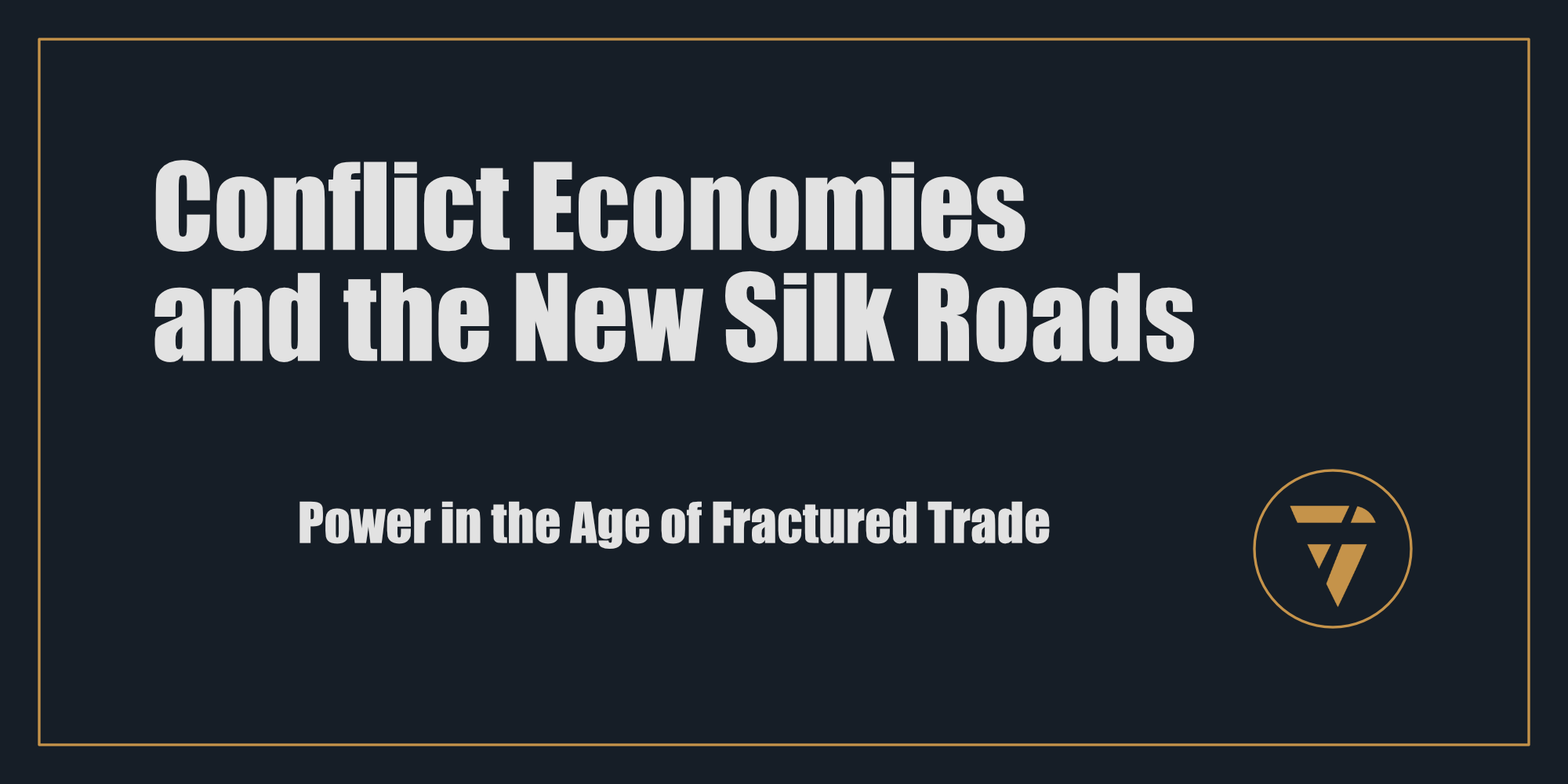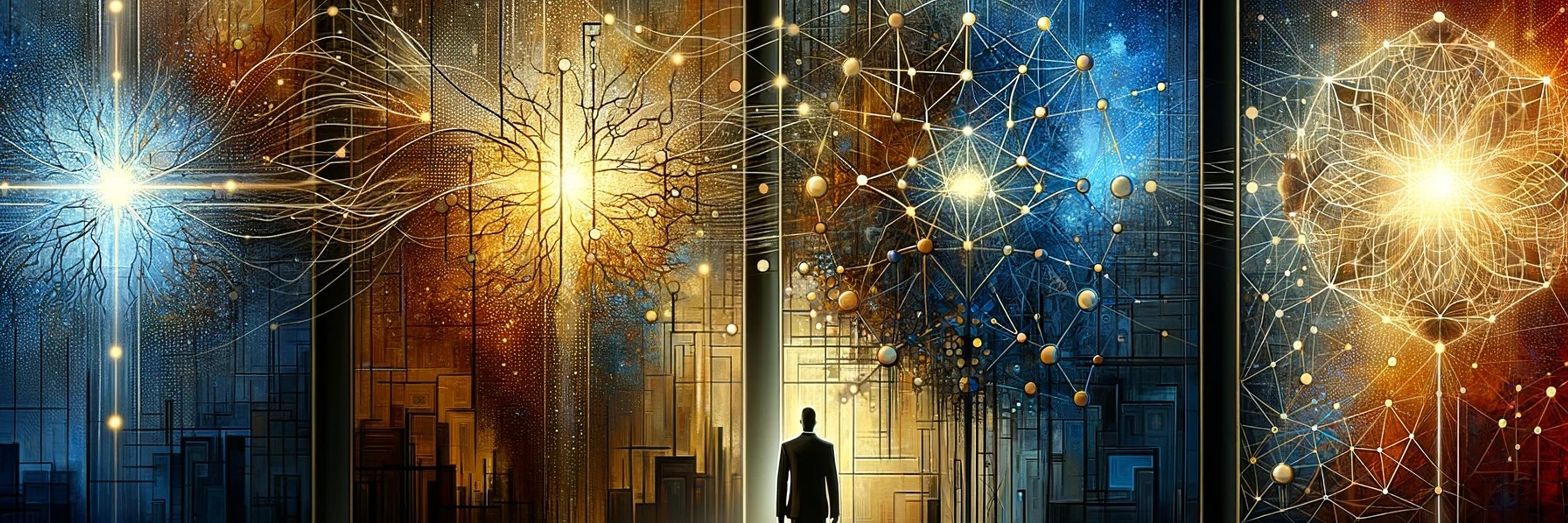Conflict Economies and the New Silk Roads

Power in the Age of Fractured Trade
For centuries, trade has been the foundation of power. Empires did not rise through military might alone—they dominated supply chains, controlled resources, and dictated the flow of goods across continents. Rome had its roads. The British Empire had its naval routes. The United States had its dollar-backed global trade system.
Now, that system is breaking.
The world is no longer united under a single economic framework. Instead, we are entering an era of fragmented trade, competing financial systems, and regional power plays. The old pillars of globalization—U.S.-led free trade agreements, stable supply chains, and open markets—are no longer guaranteed. In their place, a new order is emerging, one driven not by institutions, but by necessity.
- Sanctions and economic warfare have divided the global economy into competing spheres.
- Conflict zones are becoming economic hubs, supplying weapons, energy, and illicit goods.
- The dollar is no longer the only currency of global trade—alternatives like China’s yuan and decentralized finance are rising.
- The Global South is forging its own pathways, no longer dependent on Western-dominated institutions.
This is not deglobalization—it is re-globalization, built on new alliances, informal markets, and alternative trade routes.
And at the heart of this transformation is a resurgence of an old idea: The Silk Road.
The Return of the Silk Roads: A New Era of Power Trading
The original Silk Road was not just a trade route; it was a geopolitical strategy. It allowed empires to expand, merchants to accumulate wealth, and civilizations to exchange ideas, technology, and influence.
Now, a new network of trade routes is emerging, one that bypasses Western control and creates alternative economic corridors that reshape global power.
The Belt and Road Initiative (BRI): China’s Economic Empire
China’s Belt and Road Initiative (BRI) is the single most ambitious trade realignment in modern history. It's not just infrastructure, it's influence.
- Ports in Africa, highways in Pakistan, rail lines in Europe—each one deepens China’s economic footprint.
- BRI-linked economies are shifting away from U.S.-led financial systems, relying instead on Chinese investment and trade.
- Debt diplomacy is creating client states—nations that owe their economic survival to Beijing.
The result? A trade network that moves commodities, capital, and political allegiance away from the West and toward China.
The Middle East: The Trade Crossroads of the Future
The Gulf states—long seen as mere oil suppliers—are redefining their economic role.
- The UAE and Saudi Arabia are positioning themselves as global trade hubs, balancing relationships between China, the U.S., and emerging economies.
- Qatar and Iran are leveraging energy diplomacy, making trade deals that bypass Western restrictions.
- Turkey is reviving its historic role as the gateway between Europe and Asia, investing heavily in logistics and trade networks.
These countries are not picking sides—they are creating a multi-aligned trade system that benefits them regardless of global conflicts.
The Gulf states have some of the most damaging social constructs, but also some of the most innovative growth for generations. Their development and infrastructure thinking within family networks is breathtaking, and fun to work with.
The Russia-Iran-India Trade Axis: Sanctions-Proof Commerce
Western sanctions have not isolated Russia and Iran—they have forced them to innovate.
- New trade corridors between Russia, Iran, and India allow goods to move outside the Western-controlled financial system.
- The International North-South Transport Corridor (INSTC) is an alternative trade route linking Russia to India through Iran, avoiding Europe and U.S. controls.
- Russia and China are creating payment networks that bypass SWIFT, reducing their exposure to Western financial warfare.
The West may try to block these economies—but alternative trade routes ensure they continue to function.
The Rise of Conflict Economies: How War Shapes Trade
Conflict is no longer just a disruption to trade—in many cases, it has become the trade.
The modern world is seeing a surge in conflict-driven economies, where war is not a crisis, but an industry.
The Arms Trade: Weapons as Currency
Global instability has created a new boom in the arms trade, with nations, militias, and private military companies fueling demand.
- Turkey, Iran, and North Korea are emerging as key suppliers for states and insurgents who can’t buy from the West.
- The UAE and Saudi Arabia are using weapons diplomacy to expand influence in Africa and Asia.
- Russia has replaced traditional exports with arms sales, using military supply chains to maintain its economy.
The result? Weapons have become a new form of currency, traded as part of strategic alliances.
Sanctions and Shadow Markets: How Illicit Trade Thrives
Economic sanctions are not stopping trade—they are redirecting it.
- Iran has built a parallel oil trade network, using illicit routes to sell crude outside official markets.
- North Korea bypasses financial restrictions through cryptocurrency and proxy companies.
- Africa’s resource-rich nations are moving minerals, gold, and raw materials through backchannels, outside IMF and WTO controls.
Conflict zones have become centres of economic innovation, as nations find ways to evade restrictions and keep their economies moving.
The Future of Money: Digital and Decentralized Trade
The global financial system is no longer U.S.-centric.
- China and Russia are pushing for non-dollar trade settlements, reducing dependence on Western-controlled financial networks.
- Cryptocurrency and decentralized finance (DeFi) are being used by states and organizations that need to bypass traditional banking.
- Sovereign digital currencies (like China’s digital yuan) could become the new standard for trade between authoritarian and emerging economies.
Money itself is becoming as fractured as global trade.
The Role of Canada: A Strategic Player in the New Trade Order
Canada is uniquely positioned in this evolving trade landscape. As the world fractures into competing economic networks, Canada can either double down on a declining U.S.-led order, or expand its reach into new markets.
Energy and Resource Diplomacy
- Canada can bypass U.S. energy politics by expanding direct LNG and critical mineral exports to Europe and Asia.
- A Canada-Gulf trade agreement could position it as a key partner in the next era of global trade.
- Expanding rare earth mineral partnerships with Japan, South Korea, and the EU will reduce reliance on China’s supply chain dominance.
Becoming a North American Logistics Hub
- Investing in Arctic shipping routes positions Canada as a central player in future trade corridors.
- Strengthening trade links with Mexico offers a strategic alternative to over-reliance on the U.S.
- Developing independent financial agreements with ASEAN and Central America could integrate Canada into the fastest-growing markets in the world.
A New Global Role: The Neutral Trade Power
As the U.S. and China battle for economic dominance, Canada has the opportunity to act as a neutral trade power, forming partnerships across multiple blocs without being pulled into direct confrontation.
The question is: Will Canada seize this moment, or will it be left behind?
Trading Power in a Fractured World
Trade is no longer about efficiency, it's about strategy.
The world is not deglobalizing—it's reorganizing. New trade corridors, alternative financial systems, and conflict-driven economies are reshaping the flow of power.
The nations, corporations, and regions that adapt to this shift will emerge stronger.
Those who cling to the past will be sidelined.
The New Silk Roads are already being built. The only question is:
Who will control them?
We need to build, now.
This is what I’m working on. Tell me what you think, I enjoy the conversation! Subscribe and follow the work in real time.
Thanks!
B

The winners of the next century won’t be the biggest economies, but the ones that control the new trade routes.
PS -






